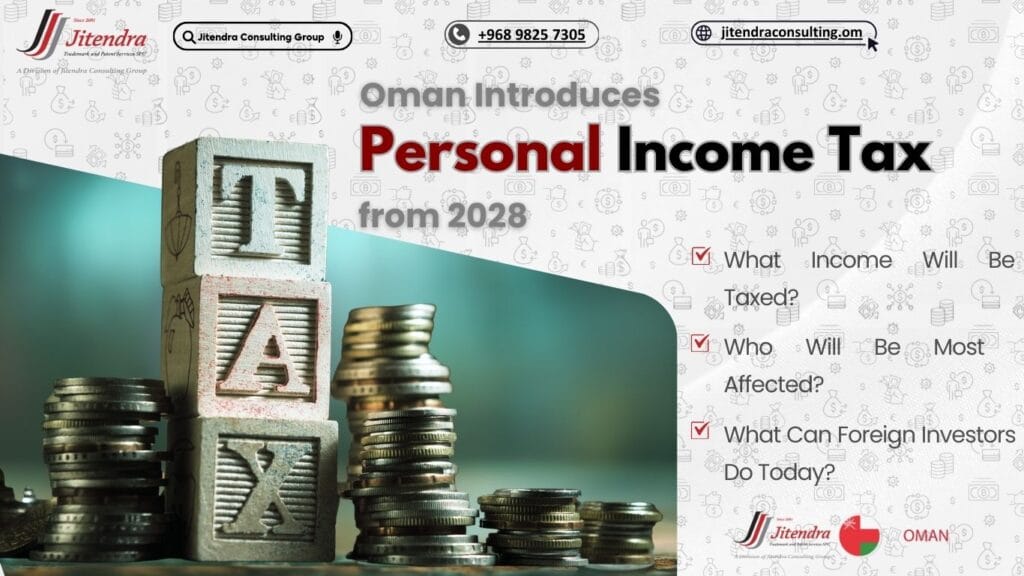Oman Introduces Personal Income Tax from 2028: What Investors Must Know Now
Do you run a business in Oman or plan to set one up soon? If yes, then here’s something that demands your attention. Oman has officially confirmed the introduction of personal income tax, effective from 2028. For years, investors and professionals have chosen Oman for its no-income-tax promise. That’s changing. And while it won’t affect everyone, it certainly will impact many foreign investors, consultants, directors, and high-earning employees.
This change might feel unsettling, especially if your business strategy was built on the country’s earlier tax structure. But here’s the good part: there’s time to adapt. At Jitendra Trademark and Patent Services, we work closely with investors like you to help manage these transitions smoothly. Let’s explain how the Oman personal income tax 2028rule may shape your future decisions and how you can prepare effectively.
The Shift in Oman’s Tax Approach
Oman’s decision to bring in personal income tax isn’t sudden. It’s part of a larger national plan to reduce its dependence on oil income and stabilise public finances. The Ministry of Finance had hinted at this move in earlier fiscal reports, and now it’s real. Starting January 1, 2028, a flat 5% tax will apply to annual net personal income exceeding OMR 42,000, roughly USD 109,000.
This applies to both Omanis and expatriates. The government has designed the rule to target high-income earners, which means about 99% of the population remains unaffected. But for the remaining 1%, this is a big change. Many of these individuals are foreign investors, consultants, or high-level corporate staff.
What Income Will Be Taxed?
The Oman income tax law will cover a broad range of personal earnings. However, it’s essential to remember that only net income above OMR 42,000 per year will be taxed. Net income means what remains after permitted deductions, though the list of deductions is yet to be finalised. As per the latest announcements, taxable income could include earnings from direct employment, board and director fees, freelance work, rental profits, and professional services.
Certain categories, such as overseas earnings or capital gains from primary residences, may receive exemptions. But this still remains under review. If you’re an SME owner or expat investor, and your total income from multiple sources crosses the tax threshold, it’s time to review how your financial records are maintained.
Who Will Be Most Affected?
Here’s where we’ll make it simple. These are the groups that should start planning today:
· Foreign professionals earning above OMR 42,000 annually
· Expat business owners who draw salaries or consultancy fees
· Board directors with cross-border income
· Executives receiving housing or travel allowances
· Consultants or freelancers with mixed income streams
· SMEs with expat senior staff whose remuneration exceeds the tax limit
If you’re in one of these categories, the upcoming tax could reduce your disposable income unless you plan. You might also need to revise how your business accounts for such payments in internal payroll systems.
What Can Foreign Investors Do Today?
With three years in hand, foreign investors and high earners in Oman should not wait. This isn’t a last-minute decision issue. Your best strategies will come from early reviews.
Look at your current income structure. If you’re drawing a director’s fee, salary, or consultancy income in Oman, check how much of it may be taxed. If your income is close to or over the threshold, it’s worth analysing whether non-taxable benefits or deductions can be introduced. Also, if you have overseas income, the duration of your Omani tax residency may affect your exposure.
Residency rules are likely to play a key role in defining taxable income. Cross-border taxation is complicated, and planning ahead is always smarter than reacting late. Many investors are exploring alternative holding company structures or tax-optimised compensation routes. But don’t experiment on your own, work with professionals who understand both local and international laws.
How Jitendra Trademark and Patent Services Can Support You
At Jitendra Trademark and Patent Services, we assist foreign investors, consultants, and SME owners to set up and grow businesses in Oman with total legal and tax clarity. We’ll help you assess your exposure under the Oman personal income tax 2028 rules and restructure where needed to remain efficient and compliant.
Our team can guide you on smart compensation structuring, documentation, tax residency planning, and internal reporting mechanisms, keeping your business one step ahead of the curve. We offer direction, supported by decades of experience in Oman’s business environment. If you’re just starting out or already operating in the region, we’ll make sure you move into this new tax era confidently and legally sound.
Contact us today, and let’s build your future business in Oman.
Frequently Asked Questions (FAQs)
What is the personal income tax in the Sultanate of Oman?
It’s a new personal income tax announced by the Sultanate of Oman, which will take effect on January 1, 2028. It will be applied to the annual net personal income that exceeds a certain threshold, and it is designed to target high-income earners, both Omanis and expatriates.
Is there an income tax in Oman?
Traditionally, Oman has had no personal income tax. However, starting from 2028, an income tax will be applied to high-income individuals as part of the government’s plan to diversify its revenue sources.
What is the tax rate in Oman?
The new personal income tax in Oman will be applied at a flat rate of 5%. This rate will be imposed on the portion of annual net income that exceeds the threshold of OMR 42,000 (approximately USD 109,000).
How is income tax calculated?
The tax is calculated on the amount that exceeds the taxable threshold. For example, if your net annual income is OMR 50,000, the tax will be calculated on the excess amount of OMR 8,000 (50,000 – 42,000). In this case, the tax due would be 5% of OMR 8,000.
What is the difference between income tax and Value-Added Tax (VAT)?
Income tax is a direct tax imposed on the earnings or income of individuals or businesses. In contrast, Value-Added Tax (VAT) is an indirect tax imposed on the consumption of goods and services, and it is paid by the final consumer at the point of purchase.




